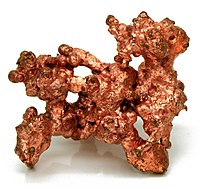
Photo from wikipedia
Nanoindentation has been widely used to measure mechanical properties for instance elastic modulus and hardness due to relatively simple sample preparation and experimental procedure. Primary limitation of nanoindentation is that… Click to show full abstract
Nanoindentation has been widely used to measure mechanical properties for instance elastic modulus and hardness due to relatively simple sample preparation and experimental procedure. Primary limitation of nanoindentation is that it does not measure quantitative mechanical properties such as yield strength, ultimate tensile strength and fracture strain unlike uni-axial tensile testing. We investigate the tensile stress-strain curve of electroplated copper using a single nanoindentation with a Berkovich indenter. Micro-tensile testing and nanoindentation were performed for three electroplated copper samples with different microstructures by post heat treatments. We find a linear relationship between the strain-hardening exponent as measured by micro-tensile testing and the log value of the characteristic length for the indentation size effect as measured by nanoindentation. By defining a representative flow stress-strain point corresponding to the Berkovich indenter along with the elastic modulus measured by nanoindentation, we obtain complete tensile stress-strain curves for electroplated copper that are in good agreement with those measured by micro-tensile testing.
Journal Title: Metals and Materials International
Year Published: 2017
Link to full text (if available)
Share on Social Media: Sign Up to like & get
recommendations!